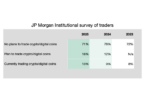On Friday, JP Morgan published a 74-page review of enterprise blockchain and digital currencies. The report says banks have yet to see tangible benefits from their ongoing funding of blockchain initiatives but is optimistic long term. It gives a three to five-year timeframe for widespread adoption. The main impediments it sees are the economy, regulation and cross-platform interoperability.
Optimal use cases in banking
JP Morgan identified trade finance as the most promising application and emphasized documentary trade or letters of credit in particular. It named a handful of banks and major platforms such as Contour and komgo for documentary trade, as well as platforms initially targeting open account trade finance, Marco Polo, we.trade and Hong Kong’s eTradeConnect.
However, it predicts the widespread adoption of these platforms is three to five years away. It didn’t mention China Construction Bank, which already has volumes of more than $50 billion.
For Know Your Client (KYC), such as the recent Dubai blockchain announcement, it sees the biggest time savings benefits. However, the report outlined challenges such as competition from SWIFT’s KYC registry, multi-jurisdictional issues and privacy.
Next up was syndicated loans, which offer high margin potential. It highlights Finastra’s Fusion LedgerComm blockchain platform, which boasts RBS, BNP Paribas, HSBC and ING as customers. But it thinks trade finance is relatively more attractive because of the enormous volumes.
The report covered a wide range of sectors, including a section on stablecoins and Libra.
Libra challenges in the eyes of JP Morgan
Early on, the report mentioned the “failed release of Facebook’s Libra”, not once but twice. JP Morgan has its own solution which it’s testing, the JPM Coin.
First off, JP Morgan says in times of stress, there needs to be a central authority that can provide short term liquidity or overdrafts. And Libra does not adopt such an approach by design.
Next, it picks up on Libra’s financial inclusion goals and says the underbanked is too small a market for cross border payments. So to be successful, stablecoins would have to focus on developed markets.
And the report states that in a negative yield environment, asset-backed stablecoins could be forced to charge transaction costs to cover deposit fees.






